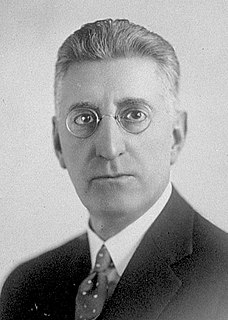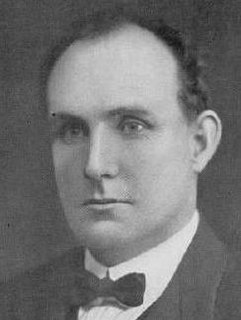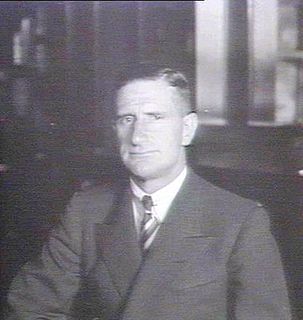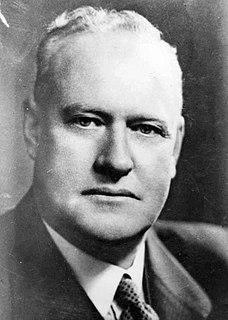Related Research Articles

John Joseph Cahill, also known as Joe Cahill or J. J. Cahill, was a long-serving New South Wales politician, railway worker, trade unionist and Labor Party Premier of New South Wales from 1952 to his death in 1959. Born the son of Irish migrants in Redfern, New South Wales, Cahill worked for the New South Wales Government Railways from the age of 16 before joining the Australian Labor Party. Being a prominent unionist organiser, including being dismissed for his role in the 1917 general strike, Cahill was eventually elected to the Parliament of New South Wales for St George in 1925.

Ernest "Ernie" Shoebridge Carr was an Australian politician. He was a member of the Australian House of Representatives from 1906 until 1917 for the electorate of Macquarie, representing the Australian Labor Party until the 1916 Labor split and thereafter joining the new Nationalist Party. He was later a Nationalist member of the New South Wales Legislative Assembly from 1920 to 1922, representing the electorate of Cumberland.

Reginald Walter Darcy Weaver was an Australian conservative parliamentarian who served in the New South Wales Legislative Assembly for 28 years. Serving from 1917 in the backbenches, he entered the cabinet of Thomas Bavin in 1929 as Secretary for Mines and Minister for Forests until he returned to opposition in 1930. Following the success of the United Australia Party in the 1932 election, Weaver returned as the Secretary for Public Works and Minister for Health in the Stevens ministry.

John Joseph Gregory "Greg" McGirr was an Australian politician who served in the New South Wales Legislative Assembly from 1913 to 1925, representing the Labor Party. He served as the party's leader for little over a month in 1923, during an internal dispute. He had earlier served as deputy leader and as Minister for Public Health under James Dooley.
Macquarie, until 1910 The Macquarie was an electoral district of the Legislative Assembly in the Australian state of New South Wales, created in 1894 and named after the Macquarie River. It was re-created in 1904, retaining nothing but the name, then abolished in 1920.

Frederick Albert McDonald was an Australian politician. He was a Labor member of the Australian House of Representatives for Barton from 1922 until 1925, when he was narrowly defeated by Nationalist Thomas Ley. McDonald was challenging the election result in court when he mysteriously disappeared in 1926. It is widely suspected that Ley, who later died in an insane asylum in England after committing murder and had several other rivals die in mysterious circumstances, was responsible for McDonald's disappearance.

Thomas James Lavelle was an Australian politician. He was an Australian Labor Party member of the Australian House of Representatives from 1919 to 1922, representing the electorate of Calare.

Francis James Foster was an Australian politician, representing the Division of New England in the House of Representatives for the Australian Labor Party from 1906 to 1913.
Clive Raleigh Evatt was an Australian politician, barrister and raconteur. He was a member of the New South Wales Legislative Assembly from 1939 until 1959. At various times he sat as a member of the Industrial Labor Party, Labor Party and as an independent.
Members of the New South Wales Legislative Assembly who served in the 23rd parliament of New South Wales held their seats from 1913 to 1917. They were elected at the 1913 state election on 6 December 1913.</ref> The Speaker was Richard Meagher.
Members of the New South Wales Legislative Assembly who served in the 24th parliament of New South Wales held their seats from 1917 to 1920. They were elected at the 1917 state election on 24 March 1917.</ref> Speaker was John Cohen until 19 August 1919 when he was succeeded by Daniel Levy.

Sir Vernon Haddon Treatt was an Australian lawyer, soldier, Rhodes Scholar and politician. Born in Singleton, New South Wales and educated at Shore School, Treatt interrupted his studies at the University of Sydney to enlist at the outbreak of the First World War. Serving in the Royal Australian Artillery, Treatt served in France and was awarded the Military Medal. Upon returning to Australia he was awarded a Rhodes scholarship and further educated at New College, Oxford.
Francis Joseph Finnan was an Australian politician and a member of the New South Wales Legislative Assembly from 1941 until 1953. He was a member of the Labor Party and held numerous ministerial positions between 1947 and 1953.
Christopher Augustus "Gus" Kelly was an Australian politician. He was a Labor Party member of the New South Wales Legislative Assembly from 1925 to 1932 and again from 1935 until his death in 1967, representing the electorate of Bathurst. He held numerous ministerial positions between 1941 and 1965 in McKell Labor Government.

The 1950 New South Wales state election was held on 17 June 1950. It was conducted in single member constituencies with compulsory preferential voting and was held on boundaries created at a 1949 redistribution. The election was for all of the 94 seats in the Legislative Assembly, which was an increase of 4 seats since the previous election.
Thomas Henry Thrower was an Australian politician. He was an Australian Labor Party member of the New South Wales Legislative Assembly from 1904 to 1907 and 1910 to 1917, representing the electorate of Macquarie.
Patrick Michael McGirr was an Australian politician.
Members of the New South Wales Legislative Council between 1949 and 1952 were indirectly elected by a joint sitting of the New South Wales Parliament, with 15 members elected every three years. The most recent election was on 31 March 1949, with the term of new members commencing on 23 April 1949. The President was Ernest Farrar.</ref>
A by-election was held for the New South Wales Legislative Assembly electorate of The Bogan on 31 May 1892 because of the death of George Cass (Protectionist).
Macquarie, until 1910 The Macquarie, an electoral district of the Legislative Assembly in the Australian state of New South Wales, was created in 1894, re-created in 1904, retaining nothing but the name, then abolished in 1920.
References
- 1 2 Green, Antony. "1917 Macquarie by-election". New South Wales Election Results 1856-2007. Parliament of New South Wales . Retrieved 13 December 2019.
- 1 2 "Mr Thomas Henry Thrower (1870-1917)". Former Members of the Parliament of New South Wales . Retrieved 8 May 2019.
- ↑ "Macquarie by-election". The Australian Worker . 12 July 1917. p. 11. Retrieved 16 December 2019– via Trove.
- ↑ "Labor's nominee". Dubbo Dispatch and Wellington Independent . 3 July 1917. p. 1. Retrieved 16 December 2019– via Trove.
- ↑ "Macquarie electorate council". Co-operator . 2 August 1917. p. 7. Retrieved 16 December 2019– via Trove.
- ↑ "13 Nationalists offering". The Sunday Times . 1 July 1917. p. 2. Retrieved 16 December 2019– via Trove.
- ↑ "Macquarie by-election". Wellington Times . 9 July 1917. p. 2. Retrieved 16 December 2019– via Trove.
- ↑ "Macquarie by-election". The Sydney Morning Herald . 6 July 1917. p. 8. Retrieved 16 December 2019– via Trove.
- ↑ "MMacquarie by-election". The Daily Telegraph . 25 June 1917. p. 4. Retrieved 16 December 2019– via Trove.
- ↑ "Macquarie National Convention". The Dubbo Liberal and Macquarie Advocate . 3 July 1917. p. 2. Retrieved 16 December 2019– via Trove.
- ↑ "Mr. H. T. Blackett". The Scrutineer and Berrima District Press . 4 February 1928. p. 2. Retrieved 16 December 2019– via Trove.
- ↑ "Macquarie Bye-Election". Dubbo Dispatch and Wellington Independent . 3 July 1917. p. 2. Retrieved 16 December 2019– via Trove.
- ↑ "Macquarie by-election". Wellington Times . 25 June 1917. p. 2. Retrieved 16 December 2019– via Trove.
- ↑ "New South Wales politics". The Argus . Victoria, Australia. 30 July 1917. p. 6. Retrieved 16 December 2019– via Trove.
- ↑ "The Macquarie election". National Advocate . 30 July 1917. p. 2. Retrieved 16 December 2019– via Trove.
- ↑ "The Macquarie election". Evening News . 30 July 1917. p. 4. Retrieved 16 December 2019– via Trove.
- ↑ "Writ of election: Macquarie". New South Wales Government Gazette (97). 30 June 1917. p. 3339. Retrieved 13 December 2019– via Trove.
- Green, Antony. "1917 Macquarie". New South Wales Election Results 1856-2007. Parliament of New South Wales . Retrieved 3 May 2020.